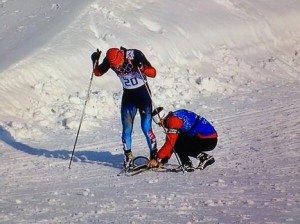A few weeks ago, I blogged about being excited to see how social media is utilized during the Winter Olympics 2014 and with the Games in full swing, I thought it might be interesting to analyze its impact so far.
While U.S. television viewing figures have been significantly down compared to the Winter Olympics in Vancouver 2010, the use of social media to follow and document the 2014 Games has reached new heights.
17 million viewers tuned in to watch Sochi on Saturday February 15th – fewer than any night of the Vancouver Games – yet, Winter Olympics’ organizers outclassed the 2010 social media reach after two days.
Sochi may well be one of the most contentious host nations of a Winter Olympics in history and social media has certainly helped to fuel the controversy. As journalists and athletes arrived at the Games, #Sochiproblems became a top trending topic on Twitter – said to be currently earning up to 50 tweets a minute.
The Twitter account @Sochiproblems was set up to document the issues and it now has over 340,000 followers – more influence than the official Sochi 2014 Twitter page, with its 269,000 followers.
I think that the popularity of documenting Sochi’s problems perhaps reflects our love of sharing anything ‘weird’ and ‘unusual’ online and should be taken with a pinch of salt. This was one of the most viral retweeted #Sochiproblems images (8,239 retweets), shared by a Yahoo sports reporter:
As I viewed Sochi tweets during the opening ceremony, I noticed the majority were negative. Sochi as a host nation was taking a massive bashing, which was a shame at this stage, since the focus should have really been on the extraordinary athletes partaking in the Games.
As the Winter sport events kicked off, it was nice to see many examples of social media being used in a positive way. For example, Barack Obama personally tweeted T.J. Oshie after his heroic actions in the US vs Russia ice hockey game. Oshie started the Olympics with 67,000 Twitter followers, but less than 24 hours after the game, that number shot to more than 200,000.
Some heartwarming stories have broken on Twitter too, including news of a Canadian ski coach rushing to give a spare ski to the Russian cross-country skier, Anton Gavarof, when he tumbled on a slippery turn and broke his ski. The new ski allowed Gavarof to finish the race, receiving a warm applause from the home crowd. The touching gesture was photographed from the TV and went viral when it was shared by the Twitter user @MrHExperience.




